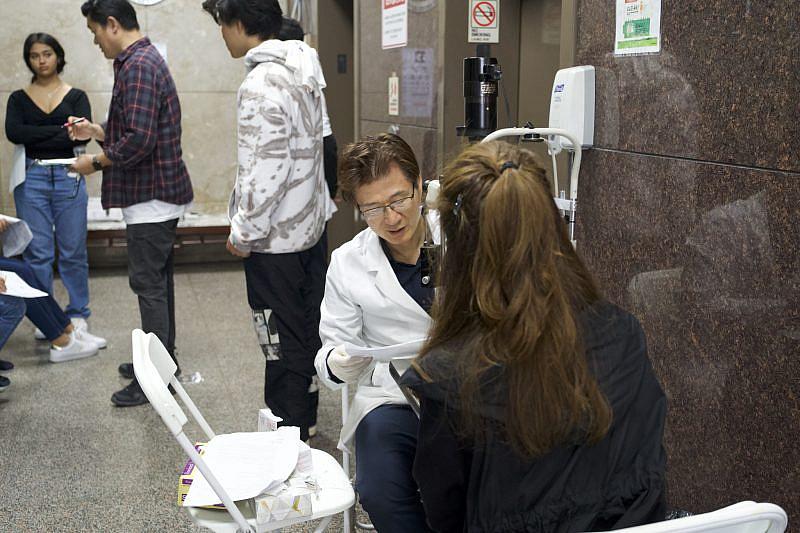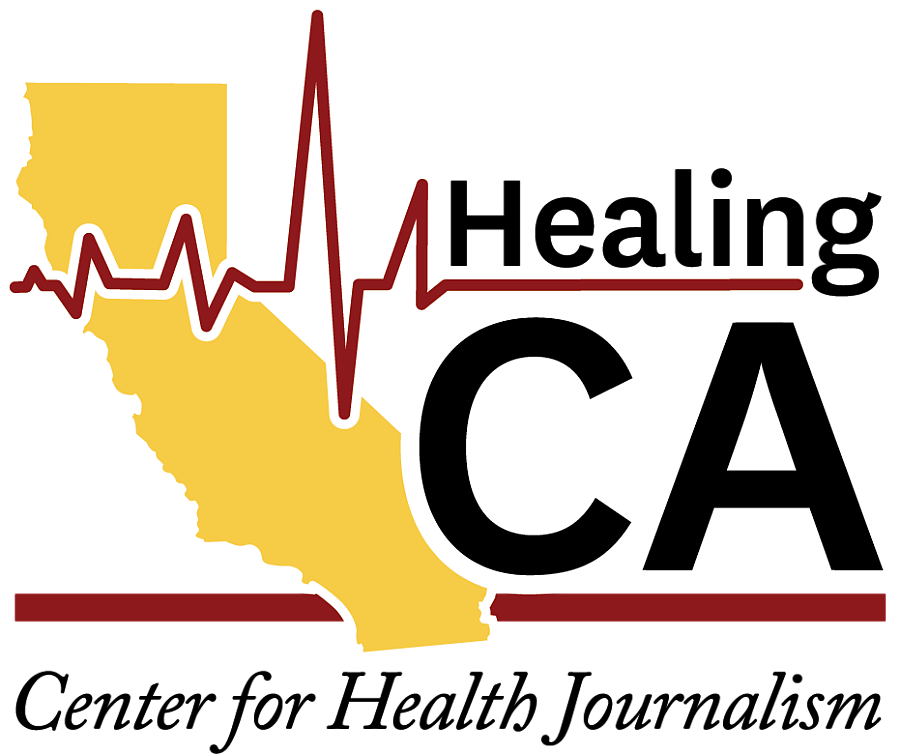Despite Medi-Cal Coverage, Undocumented Koreans Face Long Wait Times and Anxiety About What's Ahead
The story was co-published with Korea Daily as part of the 2024 Ethnic Media Collaborative, Healing California.

Ophthalmologist Sungjin Cho provides free checkups.
[Courtesy of Vision Care Services]
Undocumented Korean Americans living in California were relieved of a major worry earlier this year. The state government of California expanded Medi-Cal coverage on January 1, 2024 to allow all immigrants, regardless of their immigration status, to qualify for health care coverage. Medi-Cal is California's public health insurance program providing health care services for low-income individuals.
Until then, undocumented immigrants either had to go without treatment or pay for their own medical treatment. With the expansion of Medi-Cal eligibility, undocumented immigrants are no longer in the medical blind spot.
However, many people still hesitate to sign up for Medi-Cal due to a lack of information. As immigration policies are expected to be tightened ahead of the inauguration of the new president, some undocumented immigrants who have signed up for Medi-Cal are expressing concerns that their personal information may be shared with the Department of Homeland Security (DHS).
Nonprofit medical institutions in Los Angeles Koreatown are actively promoting Medi-Cal benefits and enrollment for undocumented immigrants. Among the recent enrollees are defected North Koreans who crossed the U.S. border from Canada.
A Korean man in his 50s, who asked for anonymity, has been living as an undocumented immigrant for 15 years while working as a delivery driver at the Fashion District. He recently joined Medi-Cal and received medical benefits to cure his stomach cancer.
“I used to pay cash to see a doctor when I was sick, then I was diagnosed with stomach cancer,” he said. ”It’s hard to pay for such expensive treatment, but fortunately, I was able to get on Medi-Cal and receive chemotherapy.”
Miriam Na, 78, who met Korea Daily through KFF Health News, has been living in Cerritos as an undocumented immigrant for 24 years. She has been receiving Medicaid benefits since May 1, 2022. At that time, the state government allowed low-income people over the age of 50 to join Medi-Cal regardless of their immigration status. Medi-Cal enrollment for undocumented immigrants has been gradually expanded in 2016 (18 years old or younger), 2020 (25 years old or younger), 2022 (50 years old or older), and 2024 (26 to 49 years old).
“After joining Medi-Cal, I have been getting blood tests twice a year. I also received hearing aids, dental care, and customized glasses services,” Na said.
For Na, who is not fluent in English, the hospital provides not only interpretation services but also a shuttle service to and from the hospital and home. The same applies to prescription drug benefits. “Medi-Cal is sometimes more helpful than my son,“ Na said with a smile.
According to Mission City Community Network (MCCN) located on Wilshire Boulevard in Koreatown, about 20 undocumented Korean Americans signed up for Medi-Cal at a free vaccine and acupuncture event co-hosted by the YMCA, Health Net, and Regal Lakeside IPA in October.
“Since this year, more than 200 undocumented immigrants have signed up for Medi-Cal through the Koreatown clinic by November 21, and 95% of them are Koreans,” said Mark Lee, the director of the MCCN. ”Most of them couldn’t go to the hospital even if they were sick, but now they are receiving one-stop medical care and prescriptions at our clinic, which is equivalent to a general hospital, including blood tests, vaccinations, internal medicine, psychiatry, ophthalmology, dentistry, and oriental medicine.”
Currently, the Kheir Clinic and the MCCN are helping people sign up for Medi-Cal, but some undocumented Korean Americans still find it hard to trust that they can sign up for Medi-Cal without any hurdles.
The Migration Policy Institute released statistics in March indicating that about 58,000 undocumented Korean Americans are living in California. That’s one in three undocumented Koreans in the U.S. living in the Golden State. Of these, more than 35,000 live in LA and Orange County alone. As of March, 4,700 undocumented Korean immigrants entered the country illegally as children with their parents (DACA), the largest number of any Asian group.
om Wong, professor of political science at UC San Diego, estimates that 30% of undocumented Korean Americans in California are uninsured.
Nonprofit medical organizations such as Kheir Clinic, MCCN, and the Department of Health Care Services (DHCS), believe that undocumented immigrants’ lack of information is delaying their enrollment in Medi-Cal.
Na said, “When I tell them that they can sign up for Medi-Cal and receive benefits, they are surprised,” “but some are hesitant to sign up for Medi-Cal even though I tell them to do so quickly.”
According to Kheir Clinic, the state government is actively encouraging undocumented immigrants to enroll in Medi-Cal. Medi-Cal eligibility is available for households with a monthly income of $3,588 or less (or $1,732 per person, or 138% or less of the federal poverty level) for a family of four.
Undocumented immigrants need an employer letter or a self-affidavit as proof of income, an MCCN official told us. Although it varies by social worker reviewer, there is a high probability of approval if there is no income record. Identification documents are also accepted, ranging from a California driver’s license (including a California ID) to a consulate ID, a library card (requires a California ID), and a passport from the applicant’s country of origin.
Jae Hee Lee, the External Affairs and Communications Specialist at Kheir Clinic, said, “Medi-Cal enrollees can receive care from primary care physicians to specialists, dental care, emergency care, hospital admission and surgery, pregnancy and childbirth, and admission to nursing homes,” adding “There is no indication that distinguishes between regular and undocumented enrollees when enrolling in Medi-Cal, and so I hope undocumented immigrants will not endure pain and join Medicaid, which does not require them to pay for medical services.”
The Kheir Clinic estimates that the number of undocumented immigrants aged 50 and older who have been allowed to enroll in Medi-Cal has increased by more than 10% since 2022.
On the other hand, there are some challenges to be addressed as the full expansion of Medi-Cal enrollment for undocumented immigrants is underway.
According to non-profit medical organizations, the increase in undocumented immigrants signing up for Medi-Cal, the abolition of income screening, the renewal of health insurance companies, and the opening of an integrated website (BenefitsCal.com) have caused delays in document submission and processing, or some omissions.

In addition, the number of enrollees experiencing difficulties due to mismatched subscriber information caused by website update failures has increased rapidly.
Maria Kim, 63, an undocumented immigrant living in Koreatown, was diagnosed with cataracts two years ago and was finally able to enroll in Medi-Cal, but had to wait several months to make an appointment with an ophthalmologist.
“I was worried because it took too long, so I heard about a free eye exam in Koreatown and I went,” said Kim. ”In the end, I had cataract surgery through a non-profit organization.”
Currently, Vision Care Services West (VCS West), an international medical aid organization, is providing related medical services in Koreatown.
“We hold free eye exams twice a year, and we have a steady stream of Korean Americans who need help,” said Jungwon Ko, the organization’s director. ”Anyone can now sign up for Medi-Cal, but as the number of enrollees has increased, the expected waiting period for appointments has also increased, leading to a high demand for free services.”
The inauguration of the second term of the Trump administration is also a factor that is increasing anxiety.
Stephanie Kim, 34, an undocumented immigrant who came to MCCN for a medical examination on November 22, said, “When I couldn’t sign up for Medi-Cal, I paid more than $200 for a doctor’s visit,” and “I’m glad I got screened for breast cancer after signing up for Medi-Cal, but I’m afraid that Trump said he will deport undocumented immigrants. Maybe I could be deported.”
Medi-Cal is operated by the state government with federal Medicaid funding. In response to the Korea Daily’s inquiry about the security of personal information of undocumented immigrants enrolled in Medi-Cal ahead of the second term of the Trump administration, which has vowed to crack down on immigration, the California Department of Health Care Services (DHCS) said, “The California government is doing its best to protect residents’ access to essential services and programs,” and “We will continue to work with the federal government to ensure that residents are healthy and communities are vibrant.”
This project was supported by the USC Annenberg Center for Health Journalism, and is part of "Healing California", a yearlong reporting Ethnic Media Collaborative venture with print, online and broadcast outlets across California
